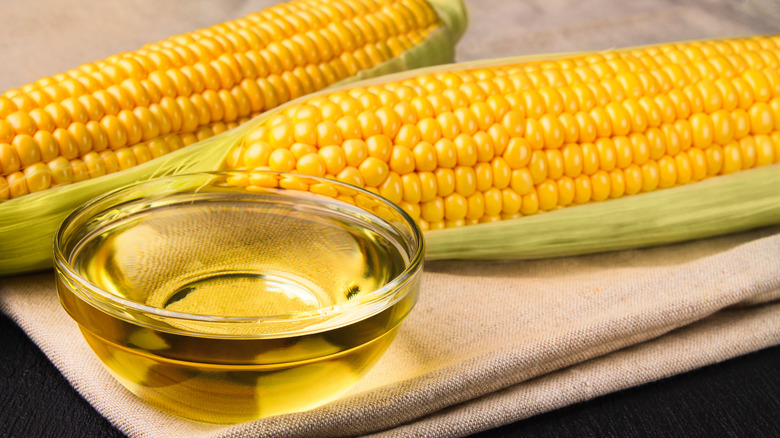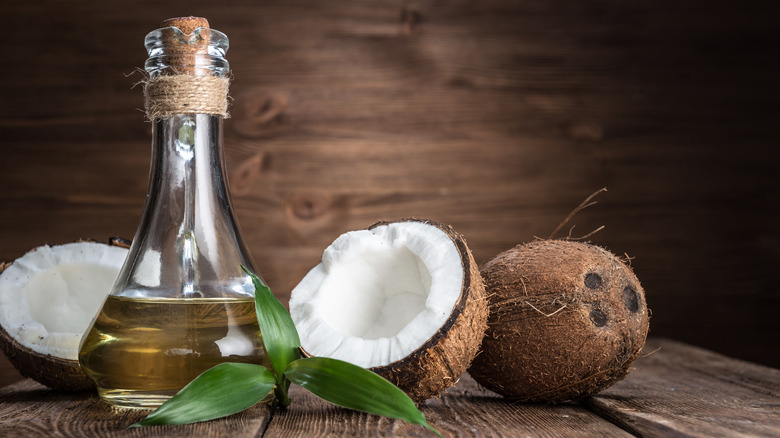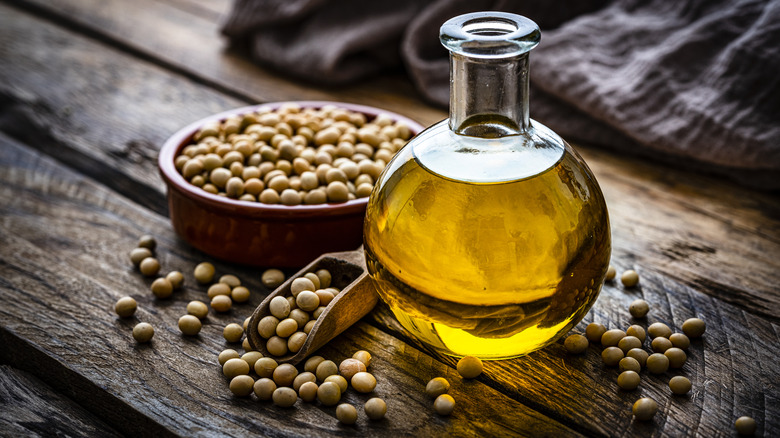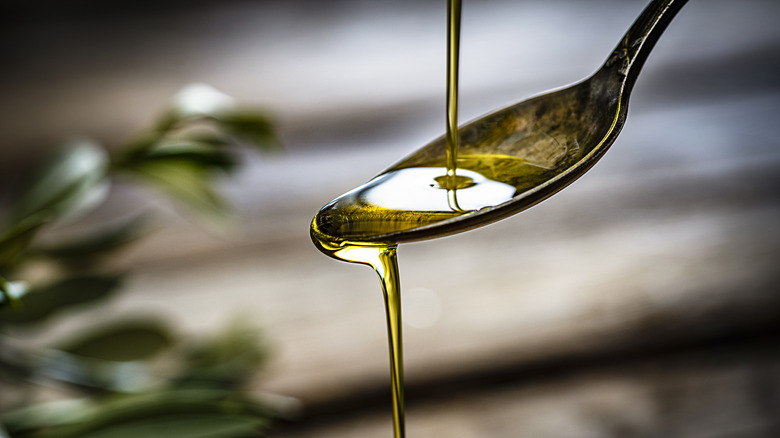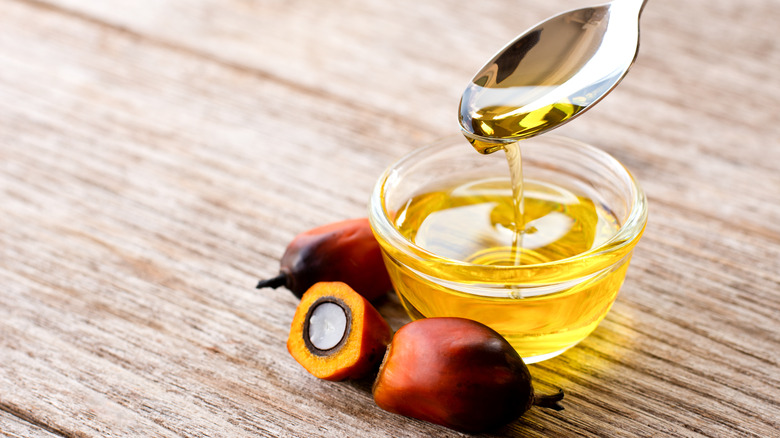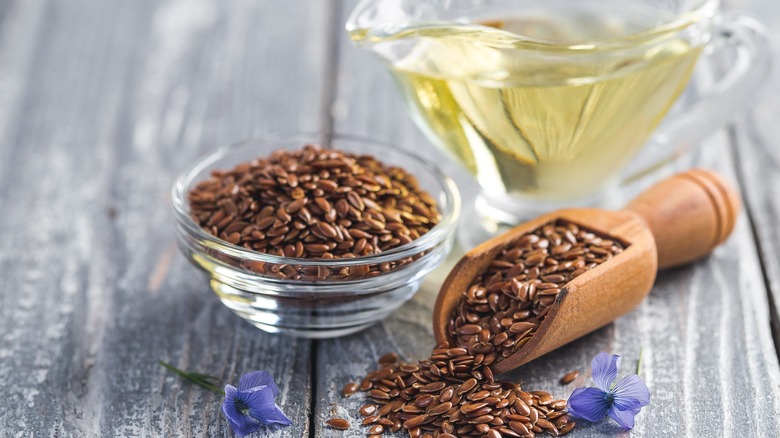10 Unhealthiest Oils You Can Cook With
When it comes to food, oils might have a bit of a bad reputation. It doesn't have to be that way, though, and we found that when it comes to cooking and frying, olive oil is one of the best choices you can make. It's an option that can make fried foods not-so-bad for you, and let's be honest: That's something we can all get on board with because fried foods are amazing. But not all oils are created equal, and there are some you should definitely stay away from.
While there are some oils that have earned their unhealthy reputation in a pretty high-profile way, there's something sneaky going on here, too. Some oils have been touted as wildly beneficial options for cooking, but continued research has found that they're anything but. It's tough to keep up with the science sometimes, so we did the research and the deep digging to find out the truth, compiled from expert sources.
And it's actually a big deal. Oils might not be a main ingredient in a dish, but there's a ton of evidence out there that suggests they have a major impact on our health. Unhealthy oils have been linked to high cholesterol and increased risk of heart disease. When it comes to cooking, some may even release substances called polycyclic aromatic hydrocarbons and aldehydes, which have been linked to the development of some types of cancers. With that in mind, let's talk about what you shouldn't be cooking with.
1. Corn oil
Corn oil is a popular option when it comes to cooking oils, as it's a neutral oil that allows the flavors of what you're cooking to really shine through. There are a lot of times when you might want to opt for a neutral oil, and although corn oil is one of the most popular choices for frying, you should probably skip this highly-refined, highly-processed oil if you have the choice.
One of the only good things left in corn oil after it goes through the extensive processing procedure is vitamin E, and while vitamin E has definite benefits, corn oil also has a high percentage of polyunsaturated fats called omega-6 fats. Not only does this type of fatty acid cause inflammation, obesity, and heart disease, but there's a lot of it in this particular oil. While corn oil also contains healthier omega-3 acids, but the ratio between unhealthy and healthy is a whopping 46:1. Given that most people have too much omega-6 in their diet, to begin with, you shouldn't be adding more.
There are a few other things to consider, too: Although studies suggest that GMO crops are safe, long-term studies are lacking. Anyone who's concerned should skip the corn oil — it's often made with GMO crops that are highly processed. Furthermore, cooking with corn oil is thought to be particularly problematic, as the heating process can create something called acrylamide, which has been linked to negative impacts on the nervous system, muscles, and hormones.
2. Coconut oil
It's no secret that coconut oil has been a big deal for a long time, but like many viral trends, it's possible coconut oil is nowhere near as beneficial as it's championed as being — especially when it comes to cooking. Although it's often touted as being a heart-healthy alternative, here's some food for thought: Coconut oil has about 50% more saturated fat than butter, and we all know that butter isn't the healthiest thing in your kitchen.
There have been claims that the particular type of saturated fats found in coconut oil is heart-healthy, but the Mayo Clinic confirms that it's their official stance that it's just not the case. They say that not only has coconut oil been linked to raising both good and bad cholesterol, but long-term research just isn't there.
That said, there's still a massive schism between public opinion and nutritionists' opinions on coconut oil, with most agreeing that it's just not as healthy as it's made out to be. The healthy fats — called medium-chain triglycerides — that most health claims are based on don't exist in any quantity in commercially sold brands of coconut oil, which instead rely on less-healthy fat chains like lauric acid. In studies that have been conducted, coconut oil has been found to raise bad cholesterol levels even more so than more traditionally unhealthy oils, including palm oil. That's some serious food for thought. (There's more to learn about the downsides of coconut oil on our sister site, Health Digest.)
3. Soybean oil
Although it's another one of those oils that's been touted as a brilliant alternative to less healthy oils, research has shown that contrary to popular belief, soybean oil might not be as healthy as it's made out to be. And it's not just a matter of heart health, with some studies showing there are some pretty shocking issues associated with the regular consumption of soybean oil.
Way back in 2015, research from the University of California, Riverside was published in PLoS One, and reported on their findings of a connection between soybean oil, obesity, and diabetes. Mice were given either soybean oil or coconut oil, and those on the soybean oil diet showed more weight gain, higher instances of diabetes, and developed insulin resistance. More research done in 2020 by the same team (via Science Daily) found that mice fed soybean oil suffered from issues with around 100 individual genes including those linked to hormone production, brain function, and the development of diseases like Parkinson's.
There is, of course, the caveat that these were studies done in mice, but it's intriguing enough that not many people would argue more research needs to be done. And it is: In 2023, researchers at the University of California, Riverside were also able to link a soybean oil diet to inflammatory bowel disease. Meanwhile, other studies have confirmed that soybean oil is high in omega-6 fats (which are associated with chronic inflammation).
4. Cottonseed oil
Here's an odd fact: Cottonseed oil is the reason that some countries in Europe have banned Ritz crackers. They might be a favorite in the U.S., but Ritz — particularly Ritz Bitz — contains enough of various oils (including cottonseed) that push it past the threshold of acceptable levels of trans fats. Cottonseed oil's affordability and availability mean that it's pretty popular for restaurants — particularly fast food restaurants — and it's found in plenty of processed foods, but opting to leave it out of your own home cooking is probably a good idea.
Cottonseed oil is highly refined, and that's a crucial part of the process. Before it's refined, it contains something called gossypol, which is a highly toxic substance that causes things like infertility and liver damage. That's not in the oil you would use for cooking, but cottonseed oil is still on the list of oils that the Cleveland Clinic considers extremely unhealthy.
Why? For starters, there's a high percentage of those unhealthy, inflammation-causing omega-6 fats, which most people consume too much of in the course of a regular diet. That can lead to serious side effects, like arthritis, heart disease, diabetes, and stroke. Furthermore, the processing procedure that removes the toxic gossypol also removes many of the naturally occurring antioxidants, and opting for another cooking oil is an easy way to avoid making an omega-6 problem even worse.
5. Hydrogenated vegetable oil
There have been a few different kinds of hydrogenated vegetable oils that have been received with varying degrees of success, and in 2015, the FDA actually banned partially hydrogenated oils. You can still buy fully hydrogenated oils, but should you? No. These oils are highly processed in an attempt to reduce the amount of trans fats in them (and to learn more about trans fats, check out this piece on our sister site, Health Digest). Although the FDA considers them safe, that's not exactly the same as being healthy.
Hydrogenated oil has been linked to a wide range of problems, especially related to cholesterol. It's been found to lower the good cholesterol and raise the bad, which is, of course, the opposite of what you want to happen. High amounts of hydrogenated oils have also been linked to an increased risk of diabetes, stroke, heart attacks, and insulin resistance, none of which are good.
But wait, there's more. Other studies have shown a connection between hydrogenated oils and inflammation, which can cause all kinds of issues. Chronic inflammation is linked to things like the development of some kinds of cancer, as well as heart disease. It's no wonder, then, that as of 2021, the European Union has put even stricter regulations on the use of hydrogenated oils in products — including baked goods and snacks — so the next time you might find yourself reaching for a bottle? Remember: It's widely banned in commercial foods for a reason.
6. Sunflower oil
Sunflower oil has been touted as having a positive impact on cholesterol levels and lowering your risk of heart disease, but here's the thing: There are actually four different types of sunflower oil, and they're not all the same.
Sunflower oils will be labeled as high linoleic, mid-oleic, high oleic, or high stearic (high oleic). That doesn't clear up anything, does it? Basically, there's two kinds of acids present in quantity in the various types: linoleic and oleic. Linoleic is another way of saying omega-6 fatty acids (those are the bad ones that we get way too much of), and contribute to things like chronic inflammation. That, in turn, can have something of a domino effect on your health. It's also worth noting that even sunflower oils labeled as mid-oleic contain as much as 35% of this unhealthy linoleic acid.
That makes none of them a really great option for cooking with, but we're not done yet. Sunflower oil is sometimes championed as a great cooking oil because it has a high smoke point, which is the temperature at which it starts to break down. However, studies suggest that sunflower oil is very unstable when it's heated, and that it can release toxic compounds called aldehydes. They're connected to things like the development of Alzheimer's and an increased risk of heart disease, so put all that together and sunflower oil isn't as healthy as it's often touted as.
7. Palm oil
As shared by our sister site, Health Digest, palm oil is cheap, widely available, and popular as a cooking oil because of its high smoke point. They also say that you should absolutely skip this one when you're looking for a healthy cooking oil, because healthy? It's anything but. There are some major concerns with palm oil, starting with studies that have linked it — and the saturated fats it contains — to an increased risk of heart disease. Interestingly, palm oil seems to interact with the body in different ways depending on how it's used, and when it's heated, studies suggest that it's more likely to contribute to arteriosclerosis or a potentially deadly buildup that collects in and clogs the arteries.
Palm oil has also been found to contribute to inflammation, which can be a bit of a Pandora's box in the opening of all sorts of health issues. Also, diets high in the same kinds of fats that are found in palm oil have been linked to an increased risk of cancers like colorectal cancer.
Palm oil is a little unique in that not only is the consumption of palm oil associated with health issues, it's the production of it is as well. It's impossible to mention it without at least touching on the issues around production, which includes slash-and-burn deforestation that has been connected to a rise in respiratory, heart, skin, and eye diseases — as well as child mortality — in areas dominated by commercial farms.
8. Flaxseed oil
Flaxseed oil has a ton of benefits, and it's been linked to helping to improve heart health and regulate blood pressure, treat (or, in high enough doses, occasionally cause) gastrointestinal problems, reduce inflammation, and improve skin health. That's all great stuff, so why are we talking about it? Because you absolutely shouldn't use it in cooking, and instead, you should keep this one for cold applications like dressing and dips.
The problem is that flaxseed oil has a relatively low smoke point, which is the temperature that the oil will burn. That means it's not only going to taste incredibly funky, but Devon Peart, RD, MHSc, BASc explained to the Cleveland Clinic, "You don't want to expose flaxseed oil to high heat. When you heat the oil, you break down the fatty acids. And it can also form free radicals, which are harmful."
What does that mean? The connection between cooking oils heated past their smoke point and an increased risk of things like cancer has been the subject of considerable research, and it still continues to be the subject of more research today. It's currently believed that overheating oils release something called acrylamide, which is classified by various agencies as most likely being a human carcinogen. Bottom line? Keep this for cold applications.
9. Canola oil
Canola oil is widely available, very affordable, and a common sight in kitchens all over the world. It's been linked to a few health benefits, it's been called one of the healthiest available oils out there, and here's the thing: Some of the studies making those claims have been backed by the canola industry. Do what you want with that little tidbit while we talk about some of the other findings.
Studies that look at canola oil and the impact it has on heart health have been wildly contradictory, with some saying it lowers the risk of heart disease, while others claim it increases something called metabolic syndrome. (That's a group of risk factors that influence a person's likelihood of developing heart disease and diabetes.) And again, a lot of the information about canola oil being heart-healthy comes from studies funded by the industry.
There may be other issues, too: Research is ongoing as to canola oil's connection with memory issues and inflammation. It's also a major source of omega-6 fatty acids, which we should be eating less of, not more. Add in the fact that it's highly refined and usually comes from GMO crops, and it's an oil that many people choose to avoid. That includes Bobby Flay, who has stated that avocado oil is his go-to replacement.
10. Grapeseed oil
Grapeseed oil is precisely what it sounds like; it's oil that's made from the pressing of grape seeds. Since it's only relatively recently that technology has allowed for processing this oil on a scale that's made it practical for commercial sale, there hasn't been too much long-term research done on it. And there is cause for concern: Some varieties are made with chemicals that aid in the extraction process, and it's unclear just whether or not substantial amounts of these chemicals remain in the oil.
Some studies have come back with bad news on the health front, with some researchers finding that regular use of grapeseed oil could be connected with the presence of a known carcinogen called polycyclic aromatic hydrocarbons. It's also been found to interfere with the body's ability to form blood clots, which could cause major problems with anyone who already has clotting issues.
Information on the safety of cooking with grapeseed oil is also lacking, but there are studies that suggest it may be a very bad idea. Although it has a decently high smoke point, there have been studies that suggest that grapeseed oil — like flaxseed oil — can become unstable when heated. That could result in the formation of toxic compounds, which is reason enough to avoid it. Add in the fact that it's highly processed, and incredibly high in unhealthy, polyunsaturated fats, and it's safe to say that you should absolutely be giving this one a miss.

